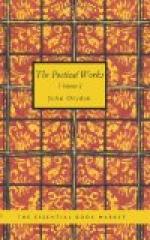And, in his father’s right, and realm’s defence,
Ne’er to have peace with wit, nor truce with sense.
The king himself the sacred unction made,
As king by office, and as priest by trade.
In his sinister hand, instead of ball, 120
He placed a mighty mug of potent ale;
Love’s Kingdom[152] to his right he did convey,
At once his sceptre and his rule of sway;
Whose righteous lore the prince had practised young,
And from whose loins recorded Psyche sprung.
His temples, last, with poppies were o’erspread,
That nodding seem’d to consecrate his head.
Just at the point of time, if fame not lie,
On his left hand twelve reverend owls did fly.
So Romulus, ’tis sung, by Tiber’s brook, 130
Presage of sway from twice six vultures took.
The admiring throng loud acclamations make,
And omens of his future empire take.
The sire then shook the honours of his head,
And from his brows damps of oblivion shed,
Full on the filial dulness: long he stood,
Repelling from his breast the raging god;
At length burst out in this prophetic mood:
Heavens bless my son, from Ireland
let him reign
To far Barbadoes on the western main;
140
Of his dominion may no end be known,
And greater than his father’s be
his throne;
Beyond Love’s kingdom let him stretch
his pen!—
He paused, and all the people cried, Amen.
Then thus continued he: My son, advance
Still in new impudence, new ignorance.
Success let others teach, learn thou from
me
Pangs without birth, and fruitless industry.
Let Virtuosos[153] in five years be writ;
Yet not one thought accuse thy toil of
wit. 150
Let gentle George[154] in triumph tread
the stage,
Make Dorimant betray, and Loveit rage;
Let Cully, Cockwood, Fopling, charm the
pit,
And in their folly show the writer’s
wit.
Yet still thy fools shall stand in thy
defence,
And justify their author’s want
of sense.
Let them be all by thy own model made
Of dulness, and desire no foreign aid;
That they to future ages may be known,
Not copies drawn, but issue of thy own.
160
Nay, let thy men of wit too be the same,
All full of thee, and differing but in
name.
But let no alien Sedley[155] interpose,
To lard with wit thy hungry Epsom prose.[156]
And when false flowers of rhetoric thou
wouldst cull,
Trust nature, do not labour to be dull;
But write thy best, and top; and, in each
line,
Sir Formal’s[157] oratory will be
thine:
Sir Formal, though unsought, attends thy
quill,
And does thy northern dedications fill.
170
Nor let false friends seduce thy mind
to fame,




